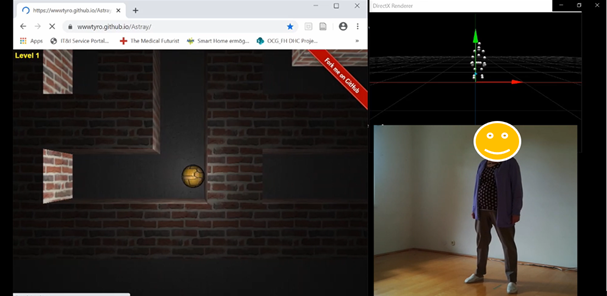Current demographic changes predict a growth in aging population. To decrease physical impairment and risk of developing chronic diseases but increase the overall health and maintain cognitive skills, the World Health Organization (WHO) highly recommends older people to conduct regular physical activity. However, elderly people (aged 60+ years) are the least active of all age groups. Reasons for that are multifactorial but with a lack of motivation, enjoyment and social interaction as key arguments. In this context, exercise-based video gaming offers an alternative to traditional exercise programs in a more creative and playful environment. Therefore, however it is essential to understand the needs of this heterogenic group. In relation to elderly people this means, adaptations to visual acuity, movement ability and cognitive skills must be considered as well as enjoyment, motivation and usability when developing an exergame.
KIM 60+ is a student project consisting of Guidelines for Exergames for elderly people and a sensor-based exergame where an open-source game is combined with a Microsoft Kinect V2 controlling with focus on fall prevention for elderly. The Guidelines focus is on usability and interventions of fall prevention for elderly people, with a length of about 40 pages. The interface to combine the sensor-based exergame with the Microsoft Kinect V2 was implemented with the program VVVV. It concentrates on lower limb exercises, which help elderly to train strength and balance to fight the risk of falling. In the picture below the concept of the exergame prototype is shown. The senior in the image controls the ball in the game with specified movements (e.g., step to the right, step to the left, stand on tip of toes, squat).

On the current market, there are already some solutions of exergames for seniors like for example, the Memorebox from Retrobrain, Tyro from Tyromotion or Silverfit. Looking into the future digital competence and compliance of senior while using electronic devices will increase. The health consciousness is going to grow in society and digital training solutions will gain importance not only in prevention, but also in therapy. Home-based digital therapy solutions will close the gap between rehabilitation and the care in terms of therapy after inpatient rehabilitation. Also senior homes or other senior facilities will gain of exergames because digital training together is fun and enjoyable and will settle as an usual activity for seniors.
Despite all the challenges, one thing is certain: as demographic change progresses, video games with exergames will find a natural place in the elderly population and even retirement homes. Developers, health workers and scientists who are prepared to deal with the challenges are in demand.
A project at the St. Pölten University of Applied Sciences Master Program Digitale Healthcare
Project Coach: FH Prof. Doppler Jakob




